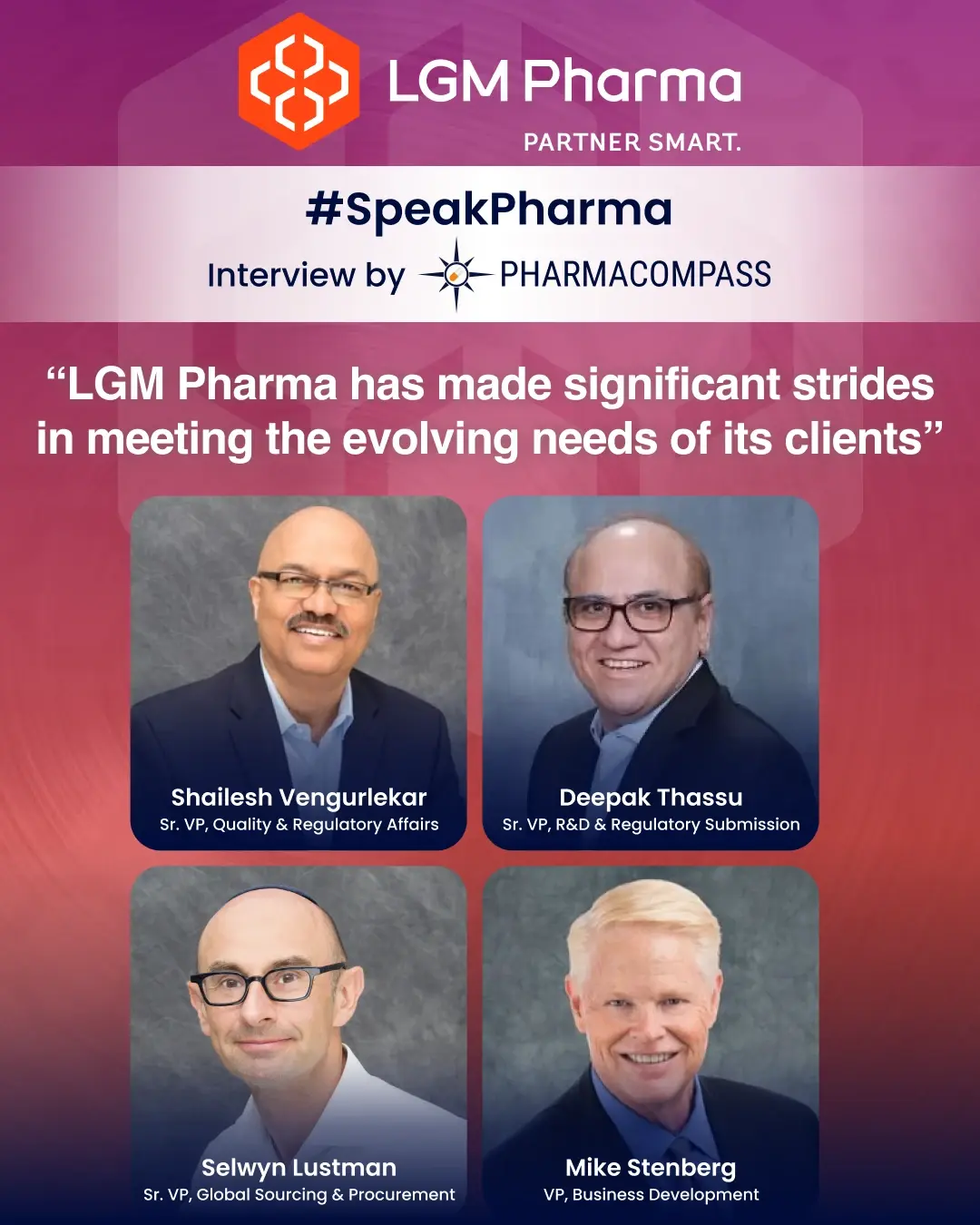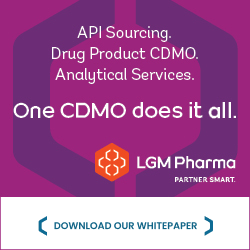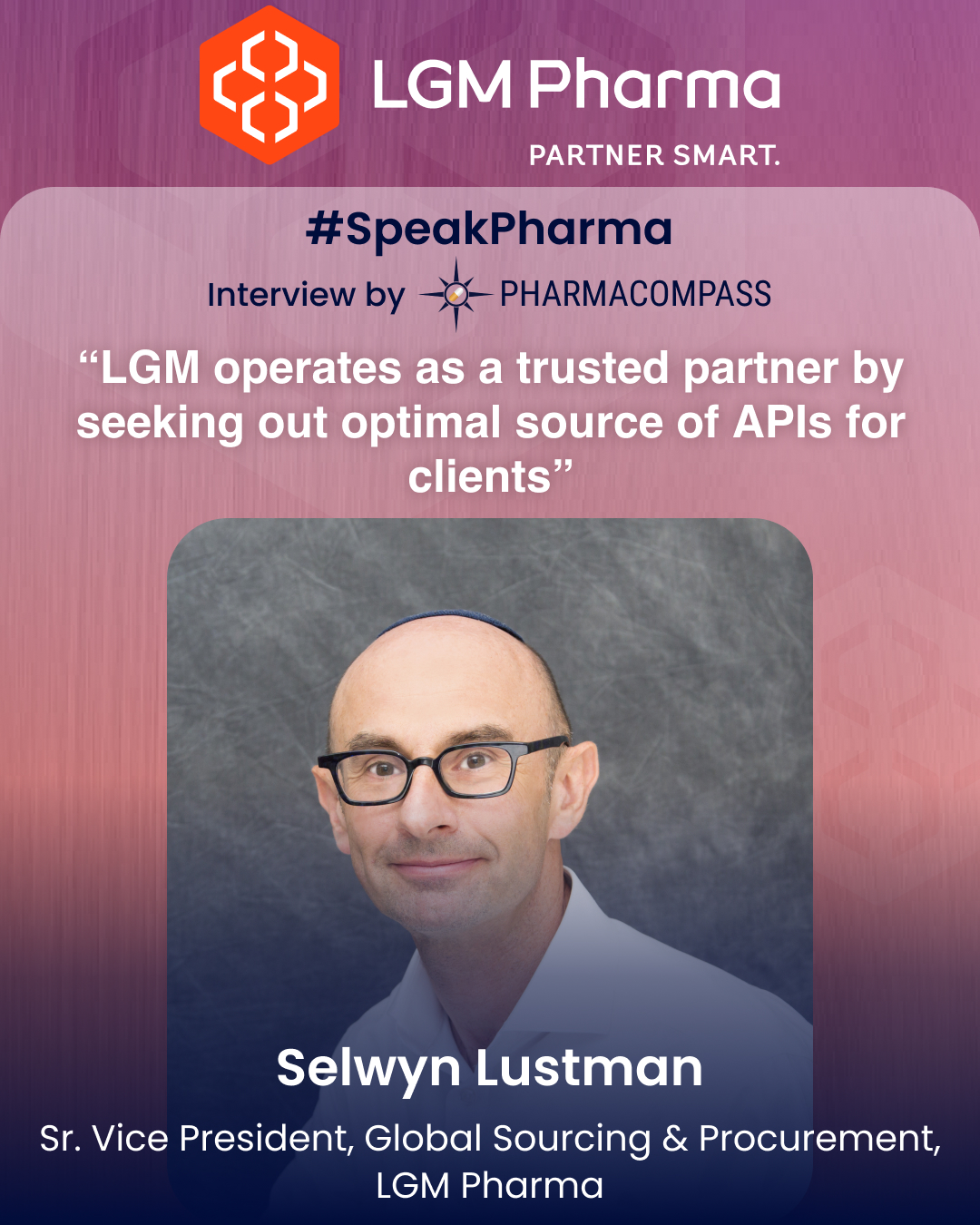
#SpeakPharma with LGM Pharma
2024-11-09
Impressions: 2749
This week, SpeakPharma interviews four senior executives of LGM Pharma — Shailesh Vengurlekar (Senior VP, Quality and Regulatory Affairs), Deepak Thassu (Senior VP, R&D and Regulatory Submission), Selwyn Lustman (Senior VP, Global Sourcing and Procurement), and Mike Stenberg (VP, Business Development). The four VPs talk about expansion in manufacturing capabilities of the Florida-based contract development and manufacturing organization (CDMO), expertise that makes LGM a strong partner and the criteria it adopts while selecting its suppliers.
HIGHLIGHTS// expansion in manufacturing capabilities/ expertise that makes LGM a strong partner/ criteria for selecting its suppliers
LGM Pharma recently invested heavily in expanding its CDMO capabilities by 50 percent. Can you share why offering standalone analytical testing services is important to LGM Pharma’s growth strategy? How does it benefit your clients?
Vengurlekar: This recent expansion in CDMO capabilities is part of LGM Pharma’s growth strategy that lays importance on diversification.
One key area of this diversification is the offering of standalone Analytical Testing Services (ATS). This service plays a crucial role in supporting our clients by providing them with greater flexibility and reliability.
LGM Pharma is already a well-established leader in the API supply chain. We have now identified a significant need in the market and are now serving compounding pharmacies, including 503A and 503B facilities. These pharmacies not only require high-quality, GMP-compliant APIs, but also need a trusted, compliant, and capable laboratory to analyze both their APIs and compounded products.
Recognizing this opportunity to further support our clients, LGM Pharma has expanded into ATS. We have witnessed tremendous growth since we’ve launched these services. By offering ATS under a separate legal entity — LGM Pharma Solutions — we are able to provide an additional layer of flexibility to our clients.
This structure eliminates any conflict of interest. While LGM Pharma LLC handles API supply, LGM Pharma Solutions focuses on delivering top-tier ATS, all under the same LGM Pharma umbrella. This setup enhances trust and allows our clients to work with us more seamlessly.
HIGHLIGHTS// diversified into standalone ATS/ well-established leader in API supply chain/ serving compounding pharmacies/ offering APIs and ATS under different legal entities.
While suppositories offer clear advantages for certain medications, can you describe how LGM Pharma plans to leverage its expertise in this area to address specific unmet needs in the growing women’s health market?
Thassu: We’re taking a dual approach to enhance both our R&D and manufacturing capabilities. First, we’ve introduced a new semi-automatic machine that allows us to produce smaller batches more efficiently. This is particularly important for the suppository segment, where demand doesn’t require large-scale production. The new system enables quicker adjustments to the manufacturing process, providing us with greater flexibility of producing small batches.
Second, many of the materials we handle in the women’s health sector are sensitive to heat, light, and oxygen. To address this, we’re upgrading our facility to accommodate these specialized requirements. This ensures we can develop and manufacture products while maintaining the integrity of heat-, light-, and oxygen-sensitive ingredients.
Additionally, we’re working closely with clients to prepare for various technical challenges. Whether it’s processing homeopathic ingredients or handling delicate fermentation-based materials, which are highly sensitive to both light and heat, our team has upgraded its skills and equipment to manage these complexities.
From technology advancements in manufacturing to specialized handling conditions and improved technical expertise, we’ve made significant strides to ensure we can meet the evolving needs of our clients and their products.
HIGHLIGHTS// dual approach to enhance R&D and manufacturing capabilities/ upgrading facilities to accommodate specialized requirements/ working with clients to address challenges.
The pandemic underscored supply chain problems. Can you detail the specific criteria LGM Pharma uses while selecting suppliers for its manufacturing processes?
Lustman: LGM looks at many facets of a manufacturer before proceeding to approve them for a specific project. We start by checking their regulatory history with the US Food and Drug Administration (FDA) and other authorities. We try to find out if they have received any warning letters. What is their inspection history? Have they received NAIs (no action indicated) and VAIs (voluntary action indicated)?
We further investigate the company’s overall business status — we need to know that they are a stable partner to work with in the long term.
Manufacturers are then assessed for their overall technology and the number of employees working in various fields, such as R&D, quality control, quality assurance, regulatory affairs, manufacturing, and the educational levels of these employees.
Once we have established that the manufacturer is a potential partner, we check their status for a particular project. We look at their advantages, and whether they have a non-infringing route of synthesis (ROS) that will allow early launch. Are they developing a second process that will be more competitive in pricing? And, does the manufacturer have the necessary capacity and/or spare capacity for the project that we are assessing?
We need to know whether the drug master file (DMF) has been registered, the current batch size, and the potential for increase in batch size. Pricing is a key indicator — we need to know whether the pricing of the manufacturer is competitive or not, and if the manufacturer will be able to compete in the future as the project matures.
LGM always assesses for quality, price, and delivery. Goods must be of the correct quality, at the right price, with delivery time as desired, in order to meet commercial needs.
HIGHLIGHTS// investigate various facets of manufacturer before approving them for a project/ look at advantages, non-infringing ROS/ assess for quality, price, delivery
Can you highlight specific capabilities and experiences LGM Pharma possesses that make it a strong partner for companies developing antibody-drug-conjugates (ADCs)?
Stenberg: ADCs are often peptides linked with small molecules. However, they may also be peptides linked with oligonucleotides. Regardless, LGM can help manage the supply chain associated with the components that are used in the conjugation of the ADC.
LGM has extensive experience, and an extensive network around sourcing and managing the supply chain associated with ADC components. LGM’s experience and capabilities extend to sourcing peptides, small molecules or oligonucleotides used in the conjugation process.
Additionally, given our deep relationships in the supply chain aspect of this process, LGM may also be able to identify partners who can help with the conjugation process itself.
HIGHLIGHTS// extensive experience, network around sourcing, managing supply chain associated with ADC components / identify partners that can help with conjugation process





